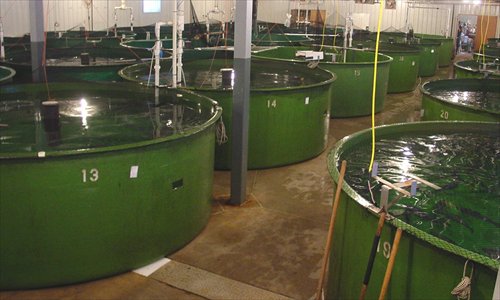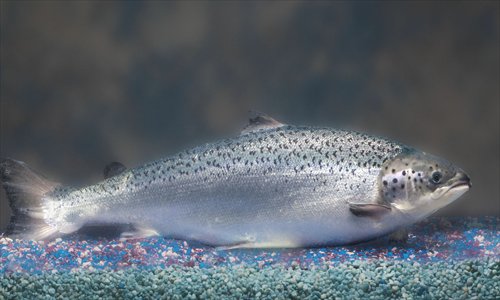HOME >> METRO BEIJING
Anyone for salmon?
Source:Global Times Published: 2015-11-26 19:28:01
Genetically engineered fish gets US FDA stamp of approval

First US Food and Drug Administration approved genetically engineered meat sparks debate on Chinese social media. Photo: IC
It may take several years for genetically engineered (GE) Atlantic salmon, to come to a grocery near you. But the question remains, would you buy it to feed to your family?
On November 19, the US Food and Drug Administration (FDA), on its official website, declared AquAdvantage salmon, a genetically engineered version of the Atlantic salmon, "as safe to eat as any non-GE Atlantic salmon, and also as nutritious."
"The data demonstrated that the inserted genes remained stable over several generations of fish, that food from the GE salmon is safe to eat by humans and animals, that the genetic engineering is safe for the fish, and the salmon meets the sponsor's claim about faster growth," a release posted on the site said.
The AquAdvantage salmon is unlikely to have an impact on the non-GE fish population in the US due to the "multiple containment measures" the company says it will use at its land-based facilities in Panama and Canada, the FDA said. "[The measures] make it extremely unlikely that the fish could escape and establish themselves in the wild."
Biotechnologists around the world have been studying genetically modified organisms (GMOs), including pigs, goats and so on, and their products for more than 10 years. They are trying to find new and shorter ways to increase meat production. They also want to improve other aspects of food production, such as making milk that triggers less allergic responses.
A New York Times report published on November 19 said that in addition to the US, AquaBounty Technologies, the company that engineered the AquAdvantage salmon, said, eventually, it hopes to sell its salmon in Canada, Argentina, Brazil, and China.
Concerns about food safety still exist worldwide, and the question of whether it is safe to eat GE food still looms large for most consumers. The topic of GE salmon hitting the dinner table has been viewed more than 12 million times on Sina Weibo (a twitter-like platform with more than 200 million subscribers).
One user who called himself "Zige Chuanqi" said, "Why put GMOs on the market in such a hurry instead of spending more time studying them? We are not in a famine now!"
While another with the name "tutu_Lee" said, "I will choose the cheap and good food. People are panicking as if eating GE food would genetically change them. I think no matter if it is GE or not, when it is consumed, all food turns to the same nutrition such as protein and amino acid."

Salmon tanks at AquaBounty's research facility in Waltham, Massachusetts. Photo: CFP

The AquAdvantage salmon which grows to full size in half the time it takes regular Atlantic salmon. Photo: CFP
Tinkering with your food
According to a 2010 report published by Netease, one of China's largest news portals, genetically modifying an organism means introducing different genes to the cells of the organism to bring new features to the creature. For example, cattle can be given antibodies to make it resistant to mad cow disease, pigs can have better developed digestive systems to reduce fecal pollution and grow faster, and eggs can be made more nutritious by genetically modifying hens.
The AquAdvantage salmon is the GE version of the Atlantic salmon, a kind of salmon that only grows in warm seasons. It carries inserted genes from two other fish - Chinook salmon (a salmon that lives in cold areas) and ocean pout (an eel-like fish that has a protein in its blood that allows it to survive at lower temperatures) - that make the salmon grow faster than non-modified salmon and more resistant to cold. Before, it took about three years for an Atlantic salmon to grow into an adult, while the AquAdvantage salmon takes half the time, reaching full maturity at 18 months. The fish can also grow all year round.
The Netease report also pointed out that the shortened growth time decreased the cost of cultivation, and also lessened the odds of toxic substance accumulation. Also, it in a way, helps reduce overfishing and feeds more people.
Is it safe?
Genetically engineered salmon seems to get a lot of criticism. The New York Times report said some leading supermarkets in the US, including retailers Whole Foods, Trader Joe's, Target and Kroger, have already said they will not sell AquAdvantage salmon.
There are three major concerns about changing genes in wild plants or animals, the report said. First, regarding food and consumers, the alterations could change the plant or animal and make them harmful to people. Second, biologically, the genetic changes could also harm the plant or animal and make them less fit to survive. Finally, in terms of environmental protection, introducing new hybrid species could alter the environment in unpredictable and potentially worrisome ways.
In the salmon's case, if the genetically altered fish were to make its way into rivers and oceans, it could outcompete the wild ones, which are smaller, for food and breeding grounds.
"If it is approved, it must be safe for there are many aspects of food safety testing, including whether it is disease-causing or harmful to human health, its nutrition content, texture and flavor (and so on)," said Luo Yunbo, a professor at the College of Food Science and Nutritional Engineering at the China Agricultural University, in a report from the Beijing-based Life Time on November 24.
Luo said the current criteria of GMOs are very strict globally, and some are even stricter than non-GMOs.
"Salmon has more than 40,000 genes; only one was changed in the approved species," said Luo. "The odds are too small to cause a problem."
Who is the target consumer?
Chinese people have long been panicky about GMOs. There have been rumors on the Internet that people in the US do not consume GMOs, and they produce GMOs to export exclusively to China. In October, The American Embassy in China responded to the rumors, saying that GMOs have been widely and safely consumed in the US for over 20 years.
According to the Life Time report, the US has the most GMOs and has been enjoying them for the longest time. There are more than 3,000 kinds of genetically modified foods including soybean, corn and rape. Additionally, there's no mandatory labeling requirement regarding whether food is genetically modified or contains modified elements.
In China, there are only 17 kinds of GE foods, including soybean, corn, tomato, cotton, and rape related products, and there are no genetically modified animals on the market, said the report.
After the FDA announcement, there have been many discussions on Sina Weibo on whether China will import the GE salmon, or develop GMOs for consumption in the future.
Yun Wuxin, a food engineering PhD and a member of the Science Squirrels, an organization for Beijing-based science writers, said it is highly unlikely that the government will introduce the salmon in light of current public opinion.
He was however cautiously optimistic about there being a possibility of the salmon's arriving in China in the future.
"If our current salmon production cannot meet the market demand, and if the limitations on importing are reduced, Chinese consumers may consider the low cost of GE salmon and maybe, one day, the salmon will come to China," he said.
For Luo, more GE food in China is both a trend and a must to meet the demand of food to feed more people, and also a requirement for more healthy and nutritious food.
"For example, GE rice is rich in Beta-Carotene, which can better solve the problem of children's Vitamin A deficiency," he said.
As for the old rumor saying that people who eat GE food will fall ill in the future, both Luo and Yun said it is groundless and absurd.
There has not been a single case of food safety problem resulting from GE food in about 20 years since GE food was first allowed into the market, according to the report.
Impact on the industry
According to Dai Yifan, a research fellow at the Nanjing Medical University and an expert on xenoplastic transplantation, the FDA approval on the GE salmon is a sign of loosening restrictions on GMOs, which greatly encourages the development of other GMOs such as pigs and cattle that are waiting for approval by the FDA.
Dai told the Caijing Magazine on November 20 that since it took a long time for the GE salmon to be approved, many large biological science companies in the world have cut investment in GE animals, thinking the future is bleak due to strict government limitations.
"The approval has a positive influence on the entire industry and also on China's GMO development and research," said Dai in the report.
He said a GMO project being run by China's Ministry of Agriculture was almost shut down due to public pressure. There are only a few GE plants are approved to grow, he said.
"After the salmon goes to the market, there is great hope for other animals in the queue behind the salmon waiting for FDA approval like pig, cattle and poultry," said Dai. "And in China there is also hope for China's further research on GMOs, especially the animals with commercial value."
Global Times - Agencies
Posted in: Metro Beijing